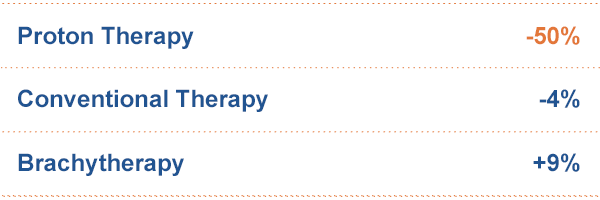Medicare’s RO-APM Proposal
On July 16th Medicare released a Radiation Oncology Alternative Payment Model (RO-APM) proposal that redefines how radiation therapy services are to be reimbursed for a subset of the radiation community. Defined as an experiment, Medicare proposes to implement a mandatory radiation bundled payment rate for 40% of radiation providers.
The UF Health Proton Therapy Institute currently bills Medicare for each individual service provided, i.e., we submit a billing code for each individual treatment a patient receives. We likewise submit a billing code for all of the other services that patients receive along with their treatment, i.e., simulation, visits with your physician, etc. The RO-APM proposal would bundle all of our services under a single billing code. It would include all services provided during treatment as well as any services provided within the 90-day period following a patient’s last treatment. On the surface, this sounds fine, as it will reduce the administrative burden in billing for lots of different services. The problem arises in the amount Medicare is willing to pay for the bundle.
In order to come up with the proposed bundled payment rate, Medicare analyzed hospital radiation oncology claims from 2015 to 2017. Unfortunately, this group of claims included very few proton treatments. Proton therapy accounted for only 0.7% of the total sample analyzed. It is difficult to understand how they could justify including protons in the bundled rate when episodes of proton therapy represented less than 1% of the total.
The proposed bundled payment rate would be the same for any radiation therapy service. Therefore, a provider would receive the same reimbursement whether the provider treats the patient with proton therapy, X-Rays (conventional therapy) or radioactive seed implants (brachytherapy). The impact between current Medicare rates and the proposed bundled rate is as follows:

Proton therapy would receive approximately a 50% cut in reimbursement under this bundled rate proposal.
As previously mentioned, this proposed experiment is to include 40% of all Medicare radiation oncology claims. In order to come up with the 40% sample, Medicare intends to select randomly various defined statistical areas that are comprised of groupings of zip codes. Medicare did not identify these statistical areas in their proposal so providers currently have no idea if they are in or out of the sample. Those selected to be in the sample will be required to participate for the length of the proposed experiment, i.e., five years. Participation in the experiment will therefore be mandatory and will last for five years.
The negative economic impact of the RO-APM proposal cannot be overstated. Proton centers will be placed in financial jeopardy, and many will not likely survive. An additional unforeseen impact of the proposal will be to jeopardize access to proton therapy for pediatric cancer patients. Proton therapy is widely recognized as the gold standard treatment for pediatric cancer patients, and closures will negatively affect future access for our most vulnerable citizens.
In summary, the RO-APM proposal will result in drastic cuts to proton therapy reimbursement. The ultimate result will be to deprive Medicare beneficiaries and other patients from access to proton therapy, a cancer treatment with excellent patient outcomes.
Here’s How You Can Help
Tell your elected leaders in congress: Protect cancer patients and challenge Medicare’s proposed reimbursement rule for radiation oncology.
The following are basic points you will want to make with your Members of Congress to urge them to take action:
- Medicare is proposing to change the way it reimburses radiation oncology services.
- The proposed rule is called the Radiation Oncology Alternative Payment Model, or RO Model.
- The proposed rule, as written, is bad for cancer patients.
- The proposed RO Model is bad for cancer patients because it would significantly decrease access to proton therapy, a type of life-saving radiation treatment that is proven to reduce excess radiation to healthy tissue and, therefore, reduce serious side effects.
- CMS (Centers for Medicare & Medicaid Services) should revise the proposed RO Model and exclude proton therapy from participation.
- Time is running out. The public comment period ends in a few weeks and the rule is slated to go into effect in January 2020.
- You have the power to stop a serious mistake in CMS reimbursement rules that will cost lives.

Click here to find your Representative and Congressional District. Or cut and paste this link into your browser: https://www.house.gov/representatives/find-your-representative

Click here to find your Senators. Or cut and paste this link into your browser: https://www.senate.gov/general/contact_information/senators_cfm.cfm

Download a letter template that you can customize with your personal experience. There is also a suggested script should you prefer to call your representative or senator directly, as well as a post for social media.
